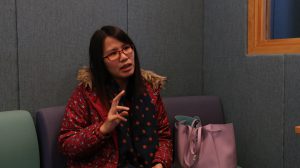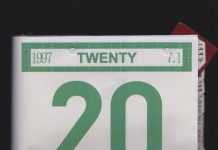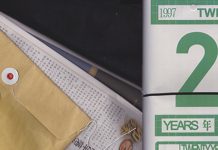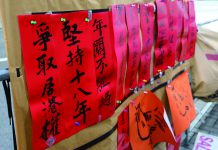As for the present political conflicts between Hong Kong and the Mainland, Lau thinks they are an inevitable and necessary consequence of the rapid strengthening of China’s economy in the last decade. “When your economy is surging at such a fast pace, many will demand a similar pace of progress in core values like freedom and democracy,” Lau says.
Like Lau Man-yee, Ng Hing Tak was also born in 1967. The difference is he was born in Guangdong and came to Hong Kong when he was 16. As a young child, Ng experienced the Cultural Revolution in China. And as a young man in Hong Kong, a signature event was the crackdown on the 1989 pro-democracy movement in Beijing. “The feeling was like, your home caught fire,” Ng says. “You wanted to rush back to save your family.” Being the same age as the student protesters in Tiananmen Square, he was moved by their sacrifice for their country’s future. It bolstered his sense of patriotism and made him want to fight for a better China.

However, in the face of today’s tensions and conflicts between Hong Kong and the Mainland, Ng now thinks Hong Kong people should put the economy first instead of focusing too much on political protest and resistance.
“People nowadays don’t understand that respect and status always comes after money,” says Ng.
Growing up in an age of instability and scarcity has instilled in Ng a strong determination to climb up the social ladder. To him, Hong Kong’s return to China represents more opportunities to prosper. “When we were studying at university,” Ng says, “we usually only thought about our aims, like buying a nice flat and car. We would focus a lot on how to improve our quality of life.”
Law Ka-lai, who was born in 1984, the year that Britain and China sealed Hong Kong’s fate by signing the Sino-British Joint Declaration, has a different view of China. She says Hong Kong people do not necessarily have a sense of belonging to China.

“I realised the great cultural difference when I went there. The food was dirty and made me sick … I can’t see a strong connection between us,” says the Chinese language teacher.
She did not always have a negative view of China. In secondary school she joined exchange tours to urban cities and service trips to rural villages and witnessed the great advances in infrastructure and technology in the Mainland. But what she has seen since then is that the economic miracle did not bring greater civil rights and political participation.
Law grew up in the 1980s and 1990s, which were the golden years of rapid economic development for Hong Kong. China’s opening up and reform policy attracted foreign capital to invest in China, and Hong Kong became a super connector. Within a couple of decades, the city had managed to transform from an industrial centre into an international financial centre. Popular culture thrived and the general living standard improved.
Law’s memory of Hong Kong at that time, under British rule, is that it was more peaceful than it is now. She admits to having different expectations for the city back then. “You would demand less at that time, since you knew you are ruled by a colonial government,” she says of the pre-1997 days.
Choy Kai-leung, who was also born in 1984, candidly says that he does not have a close bond with the Chinese people. He says he was more excited when Cheung Chau windsurfer Lee Lai-shan won a gold medal in the 1996 Olympics than by the handover in 1997.
Choy concludes that the June 4 crackdown is the major reason he identifies more as a Hong Kong person rather than a Chinese person. “Under the rule of the People’s Republic of China, the Chinese have lost their original character,” Choy says.
Every five years, Choy joins the June 4 candlelight vigil in Victoria Park, although he sees little hope of helping to build a democratic China though shouting political slogans every year. This sense of futility has contributed to the falling number of participants at the vigil recently. Last year’s turnout of 125,000, as reported by the organisers, was an eight-year low.









































